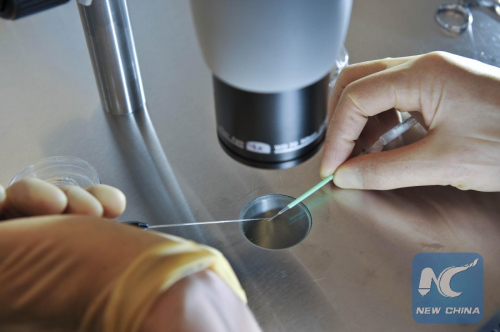
This Aug. 8, 2008 file photo, shows embryos being placed onto a CryoLeaf ready for instant freezing using the vitrification process.
The Francis Crick Institute announced Monday that its research application to use new "gene editing" techniques on human embryos has been approved by Britain' s Human Fertilization and Embryology Authority (HFEA).
The approval represents the world's first endorsement of such project by any national regulatory authority, according to Nature, a renowned science journal.
The aim of the research, led by developmental biologist Kathy Niakan at the Crick, is to understand the genes human embryos need to develop successfully.
Niakan and her colleagues will use the "gene-editing" technique CRISPR/Cas9 on healthy early-stage human embryos. By switching genes on and off in these embryos, they can look at the effects the modifications have on the development of the cells that go on to form the placenta.
These embryos will be donated by patients who have given their informed consent to the donation of embryos which are surplus to their IVF (in vitro fertilisation ) treatment, according to the Crick. Any donated embryos will be used for research purposes only and cannot be used in treatment, as is required by the regulations from HFEA, which oversees the use of gametes and embryos in fertility treatment and research in the UK.
"Dr Niakan's proposed research is important for understanding how a healthy human embryo develops and will enhance our understanding of IVF success rates, by looking at the very earliest stage of human development - one to seven days," said Paul Nurse, director of the Crick.
Based on the knowledge acquired from the project, researchers might be able to provide better clinical treatments for infertility, using conventional medical methods, according to the Crick.
Invented three years ago, the Crispr-Cas9 technique allows scientists to make precise changes to DNA, and has the potential to transform the treatment of genetic disorders by correcting faulty genes.
Niakan's team announced its application to conduct "gene-editing" on human embryos in September last year, five months after researchers in China had reported experiments applying the CRISPR/Cas9 technique to non-viable human embryos.
Although the project has been green-lighted by the HFEA, it still needs to get approval from a local research ethics board. Subject to that approval, the research program will begin within the next few months, according to the Crick.


















































